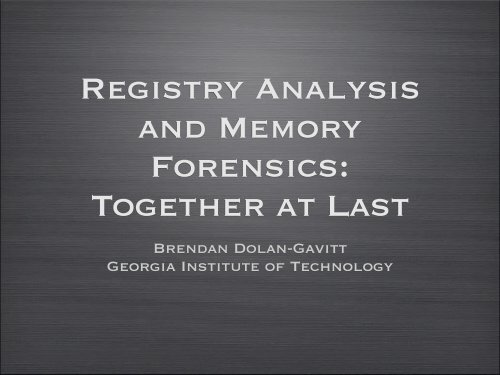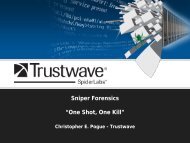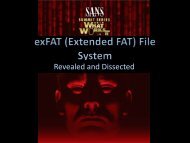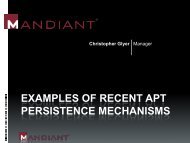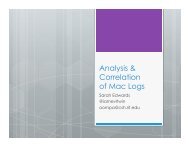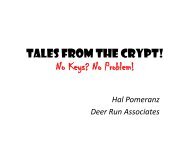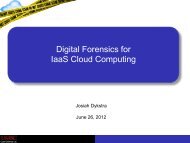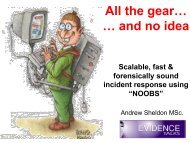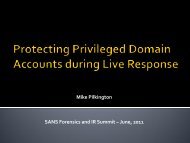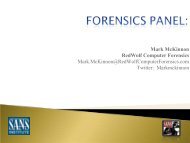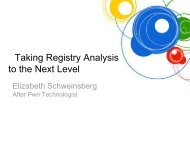Brendan Dolan-Gavitt Georgia Institute of Technology - SANS
Brendan Dolan-Gavitt Georgia Institute of Technology - SANS
Brendan Dolan-Gavitt Georgia Institute of Technology - SANS
Create successful ePaper yourself
Turn your PDF publications into a flip-book with our unique Google optimized e-Paper software.
Registry Analysis<br />
and Memory<br />
Forensics:<br />
Together at Last<br />
<strong>Brendan</strong> <strong>Dolan</strong>-<strong>Gavitt</strong><br />
<strong>Georgia</strong> <strong>Institute</strong> <strong>of</strong> <strong>Technology</strong>
• Developer on<br />
Volatility project<br />
• Grad student and<br />
researcher at<br />
<strong>Georgia</strong> Tech<br />
• Author <strong>of</strong> “Push the<br />
Red Button” blog<br />
Who I Am
Overview
• Registry Analysis<br />
Overview
• Registry Analysis<br />
• Memory Forensics<br />
Overview<br />
+
• Registry Analysis<br />
• Memory Forensics<br />
• Combining the<br />
fields<br />
Overview<br />
+<br />
=
• Registry Analysis<br />
• Memory Forensics<br />
• Combining the<br />
fields<br />
• Lots <strong>of</strong> examples<br />
throughout<br />
Overview<br />
+<br />
=
Windows Registry<br />
• Centralized, hierarchical configuration<br />
database<br />
• Structured like a filesystem<br />
• Keys = Directories, Values = Files<br />
• Rich source <strong>of</strong> forensic information
Windows Registry<br />
(cont.)<br />
• Registry appears as unified tree, but is<br />
made up <strong>of</strong> distinct hives<br />
• Standard set <strong>of</strong> systemwide hives, as<br />
well as per-user hives<br />
• Note: Registry contains some volatile<br />
data available only at runtime
Registry Data<br />
• Removable media / USB keys<br />
• Artifacts from P2P programs<br />
• Malware persistence artifacts<br />
• Password hashes (encrypted)
Registry Forensics<br />
Tools<br />
• RegLookup<br />
• Fast, robust registry<br />
parser<br />
• Parse::Win32Registry<br />
• Lower level perl module<br />
• Good for rolling your<br />
own tools<br />
• RegRipper<br />
• Undisputed king <strong>of</strong><br />
registry analysis<br />
• Produces reports <strong>of</strong><br />
forensic info
Memory Forensics<br />
• Analysis <strong>of</strong> volatile data based on<br />
memory snapshots<br />
• Allows extraction <strong>of</strong> live data, with<br />
• Higher integrity (smaller attack<br />
surface)<br />
• Repeatable results<br />
• Ability to ask new questions later
Memory Forensics Tools<br />
• Memoryze<br />
• HBGary Responder<br />
• Volatility<br />
• GPL, collaborative development<br />
• Supports plugins<br />
• My favorite ;)
Data in Memory<br />
• Current tools can extract a ton <strong>of</strong><br />
information from memory images<br />
• Processes<br />
• Threads<br />
• Drivers<br />
• Open files<br />
• Loaded DLLs<br />
• Rootkit behavior<br />
• Injected code<br />
• Encryption keys
Combining Registry and<br />
Memory Analysis<br />
• Windows keeps registry data in<br />
memory<br />
• By figuring out the internals <strong>of</strong> the<br />
Windows Configuration Manager...<br />
• We can combine these two fields!
Design Goals<br />
• Access stable registry data<br />
• Access volatile registry data<br />
• Speed up incident response<br />
• Apply existing registry analyses
Solution: VolReg<br />
• Suite <strong>of</strong> plugins for Volatility 1.3<br />
• Provides API to access registry data<br />
from XPSP2 memory images<br />
• Adds new commands for:<br />
• Showing keys / values<br />
• Dumping registry as CSV<br />
• Extracting password hashes
VolReg: Hivescan<br />
• Hivescan: finds raw <strong>of</strong>fsets in<br />
memory image <strong>of</strong> registry hives<br />
• Not very useful by itself, but<br />
needed for other plugins<br />
• Once we have one hive <strong>of</strong>fset,<br />
we can get a nicer list <strong>of</strong> all hives<br />
in memory<br />
$ volatility hivescan \<br />
-f image.dd<br />
Offset (hex)<br />
42168328 0x2837008<br />
42195808 0x283db60<br />
47598392 0x2d64b38<br />
155764592 0x948c770<br />
155973608 0x94bf7e8<br />
208587616 0xc6ecb60<br />
208964448 0xc748b60<br />
234838880 0xdff5b60<br />
243852936 0xe88e688<br />
251418760 0xefc5888<br />
252887048 0xf12c008<br />
256039736 0xf42db38<br />
269699936 0x10134b60<br />
339523208 0x143cb688<br />
346659680 0x14a99b60<br />
377572192 0x16814b60
VolReg: Hivelist<br />
• Given one <strong>of</strong> the <strong>of</strong>fsets from hivescan,<br />
finds all other hives in memory<br />
• Keep this list around!<br />
• The addresses in this list are what we<br />
will use for the other registry plugins
Hivelist Example<br />
$ volatility hivelist -f image.dd -o 0x2837008<br />
Address Name<br />
0xe2610b60 \Documents and Settings\S----\Local Settings\[...]\UsrClass.dat<br />
0xe25f0578 \Documents and Settings\S----\NTUSER.DAT<br />
0xe1d33008 \Documents and Settings\LocalService\Local Settings\[...]\UsrClass.dat<br />
0xe1c73888 \Documents and Settings\LocalService\NTUSER.DAT<br />
0xe1c04688 \Documents and Settings\NetworkService\Local Settings\[...]\UsrClass.dat<br />
0xe1b70b60 \Documents and Settings\NetworkService\NTUSER.DAT<br />
0xe1658b60 \WINDOWS\system32\config\s<strong>of</strong>tware<br />
0xe1a5a7e8 \WINDOWS\system32\config\default<br />
0xe165cb60 \WINDOWS\system32\config\SAM<br />
0xe1a4f770 \WINDOWS\system32\config\SECURITY<br />
0xe1559b38 [no name]<br />
0xe1035b60 \WINDOWS\system32\config\system<br />
0xe102e008 [no name]
VolReg: Printkey<br />
• Given a hive address and a key, prints<br />
the key and its subkeys and values<br />
• Shows last modified time, formats<br />
values according to type<br />
• Includes volatile keys & values as well<br />
• Good for just looking around
Printkey Example<br />
$ volatility printkey -f image.dd -o 0xe1035b60<br />
Key name: $$$PROTO.HIV (Stable)<br />
Last updated: Mon Jul 4 18:16:59 2005<br />
Subkeys:<br />
ControlSet001 (Stable)<br />
ControlSet002 (Stable)<br />
LastKnownGoodRecovery (Stable)<br />
MountedDevices (Stable)<br />
Select (Stable)<br />
Setup (Stable)<br />
WPA (Stable)<br />
CurrentControlSet (Volatile)<br />
Values:<br />
$ volatility printkey -f image.dd -o 0xe1035b60 CurrentControlSet<br />
Key name: CurrentControlSet (Volatile)<br />
Last updated: Mon Jul 4 18:16:59 2005<br />
Subkeys:<br />
Volatile data!<br />
Values:<br />
REG_LINK SymbolicLinkValue : \Registry\Machine\System\ControlSet001 (Volatile)
VolReg: Hashdump<br />
• Local account password hashes are<br />
stored in the registry (encrypted)<br />
• Hashdump module decrypts and prints<br />
these hashes<br />
• If LanMan hash is in use, rainbow<br />
tables can recover password in minutes<br />
• Use this power for good :)
Hashdump Example<br />
System hive SAM hive<br />
$ volatility hashdump -f image.dd -y 0xe1035b60 -s 0xe165cb60<br />
Administrator:500:08f3a52bdd35f179c81667e9d738c5d9:ed88cccbc08d1c18bcded317112555f4:::<br />
Guest:501:aad3b435b51404eeaad3b435b51404ee:31d6cfe0d16ae931b73c59d7e0c089c0:::<br />
HelpAssistant:1000:ddd4c9c883a8ecb2078f88d729ba2e67:e78d693bc40f92a534197dc1d3a6d34f:::<br />
SUPPORT_388945a0:1002:aad3b435b51404eeaad3b435b51404ee:8bfd47482583168a0ae5ab020e1186a9:::<br />
phoenix:1003:07b8418e83fad948aad3b435b51404ee:53905140b80b6d8cbe1ab5953f7c1c51:::<br />
ASPNET:1004:2b5f618079400df84f9346ce3e830467:aef73a8bb65a0f01d9470fadc55a411c:::<br />
S----:1006:aad3b435b51404eeaad3b435b51404ee:31d6cfe0d16ae931b73c59d7e0c089c0:::<br />
Hashes can now be cracked using<br />
John the Ripper, rainbow tables, etc.
Others (not shown)<br />
• Cachedump: dumps cached domain<br />
credentials<br />
• Lsadump: dumps LSA protected<br />
storage (can contain passwords)<br />
• Hivedump: dumps CSV <strong>of</strong> all keys and<br />
(optionally) values
Design Goals<br />
• Access stable registry data<br />
• Access volatile registry data<br />
• Speed up incident response<br />
• Apply existing registry analyses<br />
[✓]<br />
[✓]<br />
[?]<br />
[X]
Solution: VolRip<br />
• Python→Perl interface that makes<br />
VolReg look like Parse::Win32Registry<br />
• Now we can run RegRipper against<br />
memory!<br />
• Existing analysis plugins just work
VolRip Setup<br />
• Linux only (sorry!)<br />
• Requirements: Inline::Python, VolReg<br />
• Extract VolRip tarball into Volatility<br />
directory<br />
• Run rip.pl with the memory image and<br />
address <strong>of</strong> the hive:<br />
perl rip.pl -r image.dd@0xe1035b60 -f system
VolRip Example:<br />
Tracking USB Keys<br />
$ perl rip.pl -r image.dd@0xe1035b60 -p usbstor<br />
Launching usbstor v.20080418<br />
USBStor<br />
ControlSet001\Enum\USBStor<br />
Disk&Ven_Generic&Prod_STORAGE_DEVICE&Rev_0.01 [Sun Jun 27 05:58:42 2004]<br />
S/N: 6&a344881&0 [Wed Jun 30 00:23:07 2004]<br />
FriendlyName : Generic STORAGE DEVICE USB Device<br />
ParentIdPrefix: 7&192c45c3&0<br />
Disk&Ven_LEXAR&Prod_JUMPDRIVE_SPORT&Rev_1000 [Sat Jun 25 16:50:48 2005]<br />
S/N: 0A4F1011180132130804&0 [Mon Jul 4 18:17:50 2005]<br />
FriendlyName : LEXAR JUMPDRIVE SPORT USB Device<br />
ParentIdPrefix: 7&2930a404&0<br />
$ perl rip.pl -r image.dd@0xe1035b60 -p usbstor2<br />
SPLATITUDE,Disk&Ven_Generic&Prod_STORAGE_DEVICE&Rev_0.01,6&a344881&0,<br />
1088554987,Generic STORAGE DEVICE USB Device,7&192c45c3&0,\DosDevices\E:<br />
SPLATITUDE,Disk&Ven_LEXAR&Prod_JUMPDRIVE_SPORT&Rev_1000,0A4F1011180132130804&0,<br />
1120501070,LEXAR JUMPDRIVE SPORT USB Device,7&2930a404&0,\DosDevices\D:
Design Goals<br />
• Access stable registry data<br />
• Access volatile registry data<br />
• Speed up incident response<br />
• Apply existing registry analyses<br />
[✓]<br />
[✓]<br />
[✓]<br />
[✓]
Caveats<br />
• Since analysis is done on memory, some<br />
things might be missing<br />
• Can be especially annoying with hash<br />
dumping -- both System and SAM must<br />
be in memory<br />
• Possible future direction: dump all<br />
available registry data, then use<br />
fragment recovery
Conclusions<br />
• Applying registry analysis to memory<br />
can give you powerful new tools!<br />
• Some existing registry tools can be<br />
coaxed into working with memory<br />
• Still need tools to analyze volatile<br />
registry data (new RegRipper plugins?)
?<br />
Thanks!<br />
• To you all, for listening<br />
• To AAron Walters and the folks in<br />
#volatility<br />
• To Harlan Carvey, Tim Morgan, and<br />
many others for their work and insight<br />
on all matters registry-related<br />
? ...any questions?<br />
? ? ? ?


